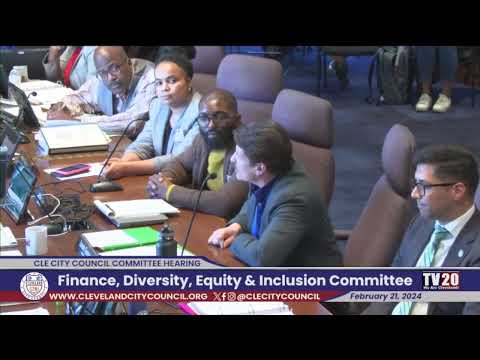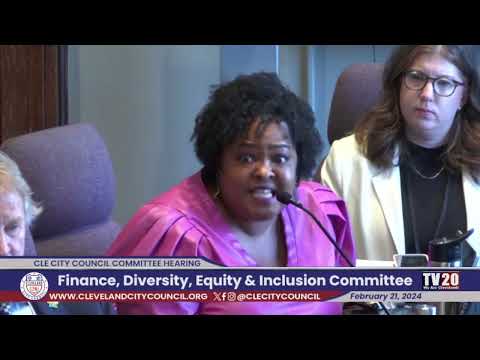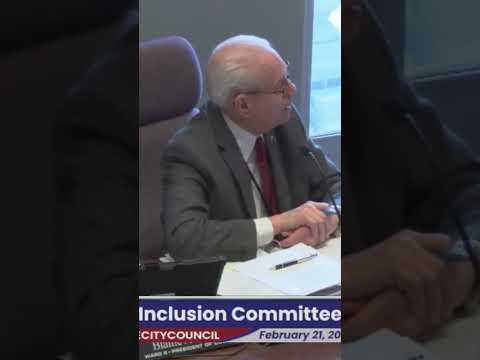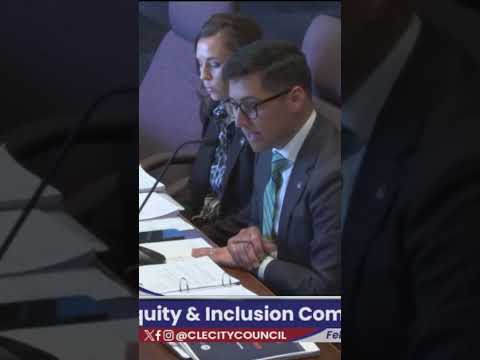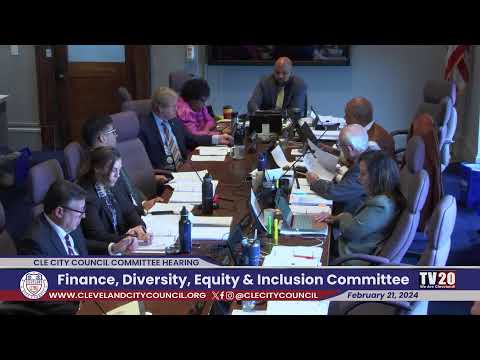‘Things are really messy and we’re asking for a broom’: Community Police Commission asks for extra money to manage community grants
Updated 6:00 p.m. | Dakotah Kennedy
The Community Police Commission asked for an additional $150,000 for a new staff position and software to help it give out community grants.
Last year, the commission awarded a little more than $1 million across 26 groups working in restorative justice, violence prevention and mediation spaces.
No money has been “distributed to the ward or street level,” according to Jason Goodrick, the commission’s interim executive director.
The two commission co-chairs, John Adams and Sharena Zayed, joined Goodrick for the presentation.
“We need a grants manager to help support this work and allow commissions to work on other things … It’s delaying the work in ways that may extend the time we are stuck in the consent decree and I’m sure no one at this table wants that,” said Zayed.
Zayed pointed out that the additional $150,000 is small compared to other costs related to police reform and the consent decree agreement, which is in the millions.
The request was a part of the commission’s 2024 budget presentation. The commission is asking for $2.36 million that is higher than the mayor’s request of $2.2 million.
The commission wants to hire a grants manager who could apply for outside funding and oversee community projects funded by the commission, according to Goodrick.
Council members asked why the commission didn’t spend its entire budget from last year. The commission returned about $300,000 in unspent money at the end of 2023, according to the city’s finance director.
The money was given back because the vacancies were a result of the administration not working with the commission to fill them, Goodrick said. He cited an example of an employee who he wanted to promote but the city denied his request.
The back-and-forth turned into a referendum on Goodrick. He was the executive director of the commission prior to the passage of Issue 24 and has been the commission’s interim executive director since it was seated in January 2023. Commissioners voted for him to remain in the job permanently last June but Mayor Justin Bibb rejected his appointment and told the commission to find other candidates. The commission has not done that.
Howse-Jones said the commissioners – not the executive director – needs to lead the independent oversight work.
The commission co-chairs said they were asking council for the resources they needed to do the work.
“We need tools. Things are really messy and we’re asking for a broom. We’re asking for the tools to clean it up,” said Zayed.
Zayed reminded council members that the commission’s $150,000 request stacks up against more expensive investments required under the consent decree.
“You can keep paying the monitor over $700,000 per year. You can continue paying outside firms $750 per hour or you can give us this so we can get [the consent decree] out of our city,” she said.
Cleveland Documenter Alicia Moreland followed along as City Council discussed the Community Police Commission budget request.
How many police officers does Cleveland need? City officials and council members debate
Updated 4:50 p.m. | Nick Castele

“How are we actually determining what is stabilized staffing?” Ward 15 Council Member Jenny Spencer asked. “Is 1,350 the number? Is there another number? Who would be determining that ultimate number?”
Abonamah discouraged council members from clinging to any one number. The city’s needs change over time, he said. What’s important is to focus on the conditions on the ground – which he acknowledged needs improvement.
“I think that’s a mistake the city got itself into several years ago, is that a number was thrown out and we’ve all held that to be gospel,” Abonamah said. “The circumstances that the division faces everyday change. What is the optimal number today might not be the optimal number a year ago.”
Cleveland City Council President Blaine Griffin also asked how the current Cleveland police staffing plan will affect specialized police units.
Read Signal Cleveland’s Nick Castele’s story digging into staffing numbers.
Cleveland Emergency Medical Services plans to outsource billing to counter recent revenue loss
City administrators projected revenues of more than $11 million for the city’s Emergency Medical Services, an almost $2.5 million increase from 2023.
The projected increase reflects a plan to outsource billing to a third party provider in the second half of the year, according to Ahmed Abonamah, the city’s chief financial officer.
Signal Cleveland’s Stephanie Casanova has more on the outsouring plans.
Not voting for ‘ghost employees’: Council members ask about police officer vacancies
Updated 3:50 p.m. | Dakotah Kennedy
Cleveland City Council’s safety committee chair, Michael Polensek, asked about proposed cuts to officer overtime in the 2024 budget. Last year, the city budgeted $13 million for overtime and spent $26 million, according to Polensek.
“What makes you think that you’re going to adhere to that $12.5 million [in 2024]?” asked Polensek.
Cleveland Finance Director Ahmed Abonamah referenced the recent move to 12-hour shifts for police officers, saying that change is expected to reduce the department’s use of overtime.
Polensek also dug back into concerns raised Tuesday about the city’s slow progress in hiring police officers. And he re-upped the issue of “ghost employees” within the police department.
“Last year, you told us you needed 1,498 [officers]. And we budgeted that. Then we heard yesterday that there are ‘ghost employees,’” said Polensek.
The city recently cut 148 “ghost” positions to repurpose that money toward recruiting and retaining police officers. Those efforts include $5,000 sign-on bonuses and increased pay for officers.
In 2023, the city budgeted for roughly 1,498 police positions. This year, the city budgeted for 1,350 positions.
The average expense for a police officer is $140,000 per year. The city hopes to hire 181 new officers.
Policing: Reactive or Proactive?
Updated 3:00 p.m. | Signal Cleveland
Council Member Richard Starr said policing is reactive. But he said the city also needs to be proactive in addressing crime through building relationships with community members, problem-oriented policing, analyzing crime data, hot spot policing, and identifying root causes of crime.

A view from Cleveland’s (budget) hearing room
Updated 12:30 p.m. | Signal Cleveland
Cleveland Documenter Nani Faye Palmer spent time hanging out, listening to the budget process and taking photos. See them below.
Have questions for Cleveland City Council about the 2024 budget? Here’s how to ask.
Updated 12:30 p.m. | Dakotah Kennedy
During Cleveland’s 2024 budget hearings, residents can reach out to Cleveland City Council with questions for feedback. Call or text 216.714.3006 or send an email to webmaster@clevelandcitcouncil.org. Council is discussing the Department of Public Safety, Community Police Commission, Office of Professional Standards and Civilian Police Review Board.
Cleveland’s Public Safety Inspector General job has been vacant since 2021
Updated 12:40 p.m. | Signal Cleveland
The 2015 consent decree between Cleveland and the U.S. Department of Justice created a new position: Police Inspector General. The role was supposed to provide a layer of oversight within the police department. In 2022, the position was expanded to include the additional divisions within the Department of Public Safety and was renamed the Public Safety Inspector General. But it has been vacant since 2021.
Read more about the Public Safety Inspector General in this Signal Cleveland explainer.
Cleveland Finance Director Ahmed Abonamah said the city hopes to fill the position this year. It has been posted in multiple places. The salary is budgeted for up to $107,000 and can be adjusted if needed. The city is looking for someone with experience in policing and also in auditing and compliance inspection.
Council members dig into the Cleveland Police Monitoring Team’s $750-per-hour price tag
Updated 12:05 p.m. | Dakotah Kennedy
“How could we have agreed to $750 per hour? How did the city come to that?” Council Member Michael Polensek asked.
“I mean, talk about cha-ching,” he said. Polensek also chairs the Safety Committee.
Several council members – including Brian Kazy, Kerry McCormack and Charles Slife – expressed concerns about the high dollar amount paid to the Police Monitoring Team.
Learn more about Cleveland’s Police Monitoring Team here. Read more Signal Cleveland’s explainers on police oversight.
“You’re making $750 per hour. What is the incentive for you to leave? There is none,” said Kazy, who referred to the consent decree as a “cash cow.”
The City of Cleveland has been under a federal consent decree for almost a decade; the Police Monitoring Team oversees the city’s compliance. The team issues regular reports detailing the city’s progress.
On Tuesday, Kazy raised the same concern when he said that Cleveland could have the perfect police force and the Police Monitoring Team would still say the city is out of compliance with the consent decree to continue getting paid by the city.
“We have not agreed to this rate,” said the city’s finance director, Ahmed Abonamah. He talked about the limited room for negotiation in the process since the consent decree is overseen by the federal – not local – government.
“What would happen if we just stopped paying?” Kazy asked.
“I would imagine a whole host of bad things, including contempt of court and general non-compliance with the consent decree, which would only, unfortunately, increase the duration of the consent decree,” Abonamah responded.
Council Member Stephanie Howse-Jones acknowledged the concerns with the cost but encouraged people to remember how the city got here.
“We didn’t get here because we were doing everything well and holding ourselves to a standard where people could believe in our city and believe in the way we were carrying out justice,” said Howse-Jones.
“How much has the City of Cleveland paid out in settlements due to misconduct?” she asked.
Abonamah said they haven’t been updated in about a year but that he would get the current numbers.
The monitoring team is going to meet with City Council in April.
Cleveland’s U.S. Department of Justice consent decree and monitoring costs:
- Proposed 2024 budget of $4,663,519
- DOJ-related costs are tied to reform and progress under the consent decree
- The Public Safety Inspector General position is still vacant.
Learn more from coverage by Documenter Lauren Hakim.
Cleveland’s budget progress kicks off on Feb. 1, when the city’s mayor publicly shares the budget proposal. City officials have until April 1 to agree how public money should be spent and for City Council to pass a balanced budget. Learn more about the steps to approving a budget in this Cleveland Documenters explainer.
Dive into Cleveland’s 2024 budget proposal
Updated 11:15 a.m. | April Urban
Signal Cleveland created a tool to help you explore the this year’s budget proposal. City Council can make and vote on changes to to the budget before it is final. The slides below highlight the spending proposals for the six city departments that make up most of the budget. Click or tap on the chart to see more details on how those funds are spent.
Play Cleveland 2024 budget hearing BINGO!
Updated 10:12 a.m. | Lawrence Caswell and Camille Renner

Cleveland pays to house people facing charges in the Cuyahoga County Jail
Updated 10:12 a.m. | Signal Cleveland
Cleveland’s corrections division:
- Has a proposed 2024 budget of $4,060,145
- Contracts with the county to house people charged with crimes
- City pays $99 a day for each person incarcerated under city codes
During a council meeting in November, Council Member Joe Jones asked about the number of daily arrests. There are fewer than 20 arrests per day, according to Lisa Scafidi, the city jail’s superintendent. She also said the number of daily arrests is less than 20 and that arrests have decreased due to criminal justice reform measures and process changes.
Learn more from coverage by Cleveland Documenter Lauren Hakim.
Cleveland’s Animal Control Division handles complaints and runs the city kennel
Updated 9:48 a.m. | Signal Cleveland

The division:
- Has a proposed 2024 budget $3,754,933
- Has 34 employees
- Would be at a loss without Friends of City Dogs and its 200 volunteers
- Received 7,989 calls for service in 2023

During a council meeting in November, Council Member Stephanie Howse-Jones expressed frustration with the city not having a new plan for addressing groundhogs, despite the issue being raised during budget hearings in previous years. She brought up the issue again Wednesday noting the city hasn’t responded to the explosion of groundhogs and concerns from residents and destruction of their homes for two years and the city has not allocated money or presented a plan to attack the problem. Finance Director Ahmed Abonamah said, to his knowledge, the city had not budgeted money to tackle the groundhog issue.
Learn more from coverage by Cleveland Documenters Karima McCree-Wilson and Regina Samuels. Check out the division’s November presentation for more details.
Council Member Joe Jones rails about ‘dumb and boneheaded’ Ohio gun laws
Updated 9:48 a.m. | Signal Cleveland

Cleveland City Council digs into the budget for safety forces
Updated 9:00 a.m. | Signal Cleveland
Today, Cleveland City Council will dig into the budget for the Department of Public Safety, which includes police, fire, emergency medical services and animal control. At more than $400 million, safety spending takes up the largest share – more than half – of the city’s General Fund.

Council members have continued to cite concerns about the shrinking size of the police force and how that affects neighborhood safety.
“My concern is that I see the numbers of the police department dropping significantly,” Council Member Michael Polensek said Tuesday. “I am concerned the police department is being slowly whittled away.”
City officials have said they are working hard to lure more officers. Last year, the city began to offer $5,000 signing bonuses, negotiated higher pay for officers in training, and raised wages for officers departmentwide. Now, an officer with five years on the job can make more than $84,000 a year.
“We are in a war for talent, not just in Ohio but across the country,” Mayor Justin Bibb told council.
Still, the number of officers Cleveland has patrolling city streets continues to decline. Since 2019, the number of officers has dropped by almost 25% to about 1,169 at the end of 2023.
After cutting long-vacant positions from the budget, Cleveland is aiming for 1,350 officers. It’s not clear whether the city can achieve that.
Some council members bristled at eliminating what Bibb called “ghost vacancies,” but the mayor said it allowed the city to avoid layoffs and invest in current and future officers. The move also allowed the city to have an “honest conversation” with the police unions about a realistic number of officers for the city, he said. The proposed budget for the police department is more than $230 million.
Watch Cleveland’s 2024 budget hearings
Miss the first day of budget hearings? Catch up
Signal Cleveland team members Doug Breehl-Pitorak, Anastazia Vanisko, April Urban, Mary Ellen Huesken, Lawrence Caswell and Rachel Dissell contributed to this liveblog.



